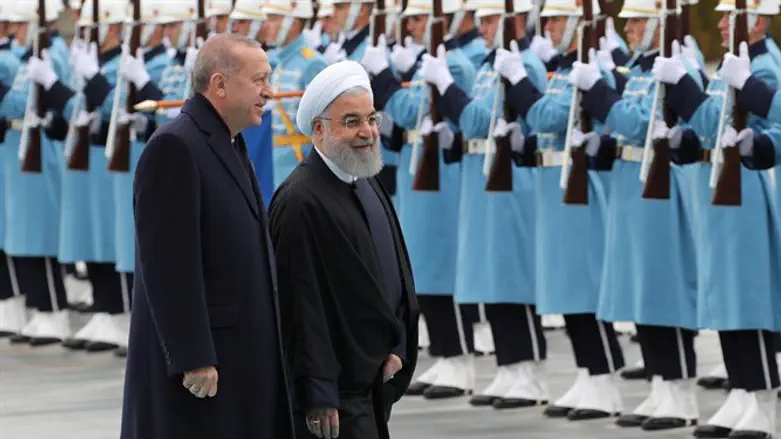
As I wrote on August 14 the war in Syria still has the potential to turn into a global conflict after Turkey threatened another ground incursion into Kurdish-controlled regions along the Turkish Syrian border and after the Syrian army breached a cease-fire agreement and started an offensive against Islamist rebel groups in the north-western Province Idlib in Syria.
At the time, the Americans tried to convince Turkish autocratic leader Recep Tayyip Erdogan not to launch another military operation in what is called Rojava, the Kurdish autonomous region along the Turkish border in Syria.
Turkey and The United States agreed on the establishment of a 250 miles wide and 18 miles deep ‘safe zone’ along the Turkish border in Syria and decided to form a joint operations center which should implement what they termed the “peace corridor” decision n.
The agreement (temporarily?) prevented the Turkish operation against the Kurdish-led Syrian Democratic Forces (SDF) but Erdogan then decided to send his forces into the Idlib Province in northwest Syria.
On Sunday, Turkish army units tried to reach the town of Khan Sheikhoun which was under attack of the Russian-Iranian-backed pro-Assad coalition.
The convoy of heavy weaponry, including tanks, was officially meant to reinforce the Turkish observation posts in Idlib but Arab media reported that the weapons were to be delivered to the coalition of Islamist rebels in Idlib which is led by former al-Qaeda offshoot Hayat Tahrir al-Sham.
It would have been the first time that NATO member Turkey tried to deliver weapons to the Syrian Islamist in broad daylight.
Turkey and the pro-Assad coalition came close to a confrontation when Russian warplanes bombed the road to Khan Sheikhoun but were careful not to attack the convoy itself.
According to Turkish and other media the Russian bombardment killed three civilians and wounded 12 others.
At the same time, Russian Foreign Minister Sergei Lavrov revealed that the Russian army had given a warning to Turkey that its Islamist allies in Idlib would be crushed if they didn’t stop their attacks on the Syrian army.
Lavrov later admitted that Russian forces were taking part in the ongoing offensive against the Islamist rebels in Idlib and are controlling 140,000 soldiers in Syria.
During a press conference on Tuesday, Lavrov warned the Russian army would “repel any attack on Russian soldiers in Syria.”
Russia’s activities in Idlib helped to turn the tides in the stand-off with Hayat Tahrir al-Sham and other rebel groups and secured a victory over them in Khan Sheikhoun which was retaken on Tuesday night by the pro-Assad coalition.
Assad’s army and the Russians have yet to establish full control over the Khan Sheikhoun region, however, and have surrounded one of the Turkish observation posts in the area.
Erdogan, meanwhile, is using other tools to influence the battle over control of northwest and northeast Syria.
The Turkish dictator is forcing thousands of Syrian refugees to return to Syria where they are supposed to help “liberating their country” in other words: fighting the Assad regime and preventing a takeover of Idlib.
In July alone 6,160 Syrian refugees were deported from Syria while a total of 337,000 Syrians have been forced to sign “voluntary return forms” ahead of their deportation.
Erdogan reportedly also is aiding Islamic State in its attempt to re-establish itself in Syria as a means to weaken the Kurdish autonomy drive in Rojava.
“Turkish intelligence and military personnel as helping to facilitate a resurgence of IS to essentially work as proxies to attack Kurdish positions and pressure the West and regional actors into supporting Turkish interests in Syria,” Breitbart reported.
Turkey has allowed thousands of Islamic State jihadists to return to Syria where they are working to re-establish the Caliphate.
Islamic State has already established a new mini-Caliphate in the huge al-Hol refugee camp under the noses of SDF units who are supposed to manage affairs in the displaced persons camp.
Refugees who are not willing to subordinate themselves to the harsh Sharia-based regime of Islamic State in al-Hol are brutally murdered while the Jihadist group is brainwashing tens of thousands of children in the camp.
The Iranians, meanwhile, are continuing their quest to take-over Syria.
Iran-founded and backed Shiite militias are taking part in the battle for control over Idlib and Hezbollah is taking-over the border with Israel on the Syrian Golan Heights.
The Iranians are also reinforcing their forces in eastern Syria where the al-Quds Force of the Iranian Revolutionary Guards Corps (IRGC) is building a huge base near the border town of al-Bukamal on the Iraqi border.
The al-Quds Force earlier built a new border crossing in al-Bukamal which is part of the so-called land bridge stretching from the Iranian border in the Nineveh Province in Iraq to the Syrian Golan Heights.
Israel is already for a long time trying to prevent the Iranian entrenchment in Syria and Iraq and reportedly has widened its actions against the Iranian axis to Iraq.
On Tuesday evening, a weapon depot belonging to Iran’s Iranian proxy al-Hashd al-Shaabi at the al-Balad base in Saladin exploded.
Iraqi officials now claim they have evidence that an Israeli drone carried out this strike and a previous attack on the al-Saqr military base near Baghdad.
Israel is carrying out strikes against the Iranians and their proxies in both Syria and Iraq with official approval from Russia and the United States according to the London-based Arabic newspaper Asharq al-Awsat.
The three countries recently held talks in Jerusalem about Iran’s activities in Syria and Iraq and reportedly reached understandings about the use of a hotline between the headquarters of the IDF in Tel Aviv and the Russian Hmeimim base in Latakia, Syria as well as the non-use of the S-300 anti-missile shield against IAF planes.
Israel is reportedly also using its new F-35 Adir stealth fighter jet to attack Iran-related targets in Iraq and Syria.